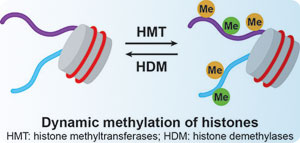Methylated and Acetylated Polyclonal Antibodies

BiologicsCorp can provide a wide variety of methylated and acetylated polyclonal antibodies, especially for histone methylation and acetylation.
Protein modification is an important step after protein translation. Precursor protein is not active without the process of posttranslational modification. The functions of the protein can be extended by adding biochemical functional groups or other posttranslational modifications.
Histone modification is a very important kind of protein modifications, which is necessary to introduce the modifications of histone, like methylation and acetylation. The procedure of adding methyl groups to amino acids of histone is called histone methylation. It can activate or inactivate diverse parts of chromatin.
Generally, the genes in deoxyribonucleic acid can be turned "off" and "on" by the methylation and demethylation of histones which enables or blocks transcription factors and other proteins to access the DNA. This process is important for the regulation of gene expression. At the same time, this modification alters the properties of the nucleosome and affects its interactions with other proteins, such as gene transcription processes.
Acetylation is the process where an acetyl functional group is transferred from one molecule (in this case, Acetyl-Coenzyme A) to another. Furthermore, this reaction is typically catalysed by enzymes with "histone acetyltransferase" (HAT) activity.
Acetylated lysine residues on histone tails is related to transcriptional activation tightly. Thus it is currently thought of as a serious regulatory mechanism of transcription. Adding an acetyl group opens up the usually tightly packed nucleosome and allows transcription machinery to come into contact with the deoxyribonucleic acid template which leads to gene transcription.

